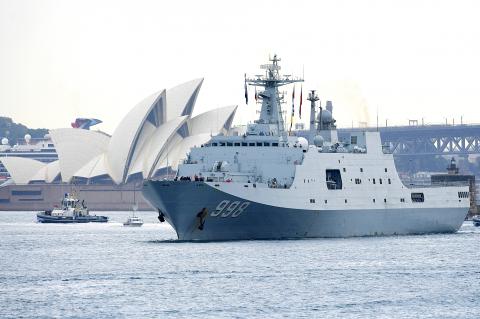Three Chinese warships yesterday sailed out of Sydney after an unannounced visit that came amid a tussle for influence between Australia and China in the Pacific Ocean.
The show-of-force call by a frigate, supply ship and amphibious warfare vessel was planned, but never announced by the Australian government.
“That raised a lot of hackles,” Australian National University professor of international security and intelligence studies John Blaxland told the Australian Broadcasting Corp.

Photo: EPA-EFE
“The ships arrived off Darling Point and other famous places in Sydney’s harbor without people knowing in advance ... and with armed soldiers and sailors on the decks of the ships looking fairly aggressive,” Blaxland said.
The vessels left for China under leaden skies in the afternoon.
The warships had arrived on the eve of the 30th anniversary of China’s bloody crackdown on pro-democracy protesters in and around Beijing’s Tiananmen Square on June 4, 1989.
Photographs showed members of Sydney’s Chinese community waiting at the navy wharf where the ships docked to greet the sailors.
“It was a reciprocal visit, because Australian naval vessels visited China,” Australian Prime Minister Scott Morrison told reporters earlier this week in the Solomon Islands’ capital, Honiara.
“So it may have been a surprise to others, but it certainly wasn’t a surprise to the government,” he added.
Ties between Australia and China hit a low last year, when Canberra passed laws aimed at thwarting Chinese influence in domestic affairs and also over China’s assertiveness in the disputed South China Sea.
Australia has offered diplomatic support to US “freedom of navigation” voyages through the region.

Tropical Storm Gaemi strengthened into a typhoon at 2pm yesterday, and could make landfall in Yilan County tomorrow, the Central Weather Administration (CWA) said yesterday. The agency was scheduled to issue a sea warning at 11:30pm yesterday, and could issue a land warning later today. Gaemi was moving north-northwest at 4kph, carrying maximum sustained winds near its center of up to 118.8kph and gusts of 154.8kph. The circumference is forecast to reach eastern Taiwan tomorrow morning, with the center making landfall in Yilan County later that night before departing from the north coast, CWA weather forecaster Kuan Shin-ping (官欣平) said yesterday. Uncertainty remains and

SEA WARNING LIKELY: The storm, named Gaemi, could become a moderate typhoon on Wednesday or Thursday, with the Taipei City Government preparing for flooding A tropical depression east of the Philippines developed into a tropical storm named Gaemi at 2pm yesterday, and was moving toward eastern Taiwan, the Central Weather Administration (CWA) said. Gaemi could begin to affect Taiwan proper on Tuesday, lasting until Friday, and could develop into a moderate typhoon on Wednesday or Thursday, it said. A sea warning for Gaemi could be issued as early as Tuesday morning, it added. Gaemi, the third tropical storm in the Pacific Ocean this typhoon season, is projected to begin moving northwest today, and be closest to Taiwan on Wednesday or Thursday, the agency said. Today, there would likely

DISRUPTIONS: The high-speed rail is to operate as normal, while several airlines either canceled flights or announced early departures or late arrivals Schools and offices in 15 cities and counties are to be closed today due to Typhoon Gaemi, local governments announced last night. The 15 are: Taipei, New Taipei City, Taoyuan, Tainan, Keelung, Hsinchu and Kaohsiung, as well as Yilan, Hualien, Hsinchu, Miaoli, Chiayi, Pingtung, Penghu and Lienchiang counties. People should brace for torrential rainfall brought by the storm, with its center forecast to make landfall on the east coast between tonight and tomorrow morning, the Central Weather Administration (CWA) said. The agency issued a sea warning for the typhoon at 11:30pm on Monday, followed by a land warning at 11:30am yesterday. As of

CASUALTY: A 70-year-old woman was killed by a falling tree in Kaohsiung as the premier warned all government agencies to remain on high alert for the next 24 hours Schools and offices nationwide are to be closed for a second day today as Typhoon Gaemi crosses over the nation, bringing torrential rain and whipping winds. Gaemi was forecast to make landfall late last night. From Tuesday night, its outer band brought substantial rainfall and strong winds to the nation. As of 6:15pm last night, the typhoon’s center was 20km southeast of Hualien County, Central Weather Administration (CWA) data showed. It was moving at 19kph and had a radius of 250km. As of 3pm yesterday, one woman had died, while 58 people were injured, the Central Emergency Operation Center said. The 70-year-old